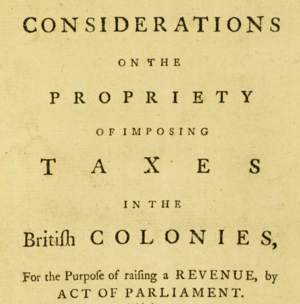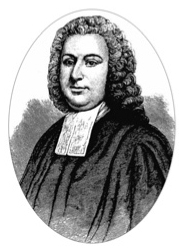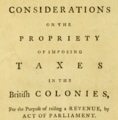Considerations on the Propriety of Imposing Taxes in the British Colonies facts for kids
Considerations on the Propriety of Imposing Taxes in the British Colonies was an important booklet written by Daniel Dulany the Younger. He wrote it to oppose the Stamp Act of 1765. This booklet was published in Annapolis in 1765.
In his writing, Dulany argued that the American colonies should not be taxed by the British Parliament. This was because the colonies did not have their own representatives in Parliament. The booklet became very popular. It helped shape what people in the colonies thought during the early days of the American Revolution.
Why the Stamp Act Happened
After Britain won the Seven Years' War in 1763, the British government decided to keep soldiers in North America. They wanted the American colonies to help pay for these soldiers. So, in 1765, Parliament passed the Stamp Act. This law said that many printed items in the colonies, like newspapers and legal documents, had to use special stamped paper from London. This was basically a tax on the colonies.
Many people in the colonies thought it was wrong for Parliament to tax them directly. This was because of a common belief in England: people should only be taxed by their own elected representatives. The British Prime Minister, George Grenville, knew about this idea. But he argued that the colonies were virtually represented in Parliament. He meant that even if people couldn't vote, Parliament members still represented everyone in the country.
Daniel Dulany's Ideas
Daniel Dulany was a lawyer and politician from Maryland. He didn't agree with the idea that colonists were "virtually represented" in Parliament. In 1765, he published his booklet, Considerations on the Propriety of Imposing Taxes in the British Colonies.
Dulany agreed that people in England who couldn't vote were still represented. This was because their interests were similar to those who could vote. But he argued that this idea didn't work for the colonies across the Atlantic Ocean. He felt that the interests of the colonists were too different from those living in England.
Dulany explained that in England, if a tax hurt people who couldn't vote, it would also hurt those who could. This was because they lived close together and shared many things. But colonists didn't have this close connection with voters in Great Britain. So, their interests were not protected in the same way. Because of this, Dulany rejected the idea that colonists were virtually represented. Many others, like James Otis, Jr. from Massachusetts, also disagreed with this idea.
Dulany's booklet also tried to explain what Parliament could and could not do. He said Parliament was supreme when it came to making laws for the whole British Empire. But he believed that Parliament only had the right to tax people in England, Wales, and Scotland. This was because taxes should be a free gift from the people, given through their representatives.
He argued that Parliament could control trade in the colonies. It could even collect some money from trade rules. But Parliament could not pass laws just to raise money from the colonies. This idea was similar to what John Dickinson later argued in his famous Letters from a Farmer in Pennsylvania.
Even though Dulany's booklet sometimes sounded angry, it suggested peaceful ways to make Parliament change the Stamp Act. He encouraged colonists to buy fewer British goods. Instead, he wanted them to use more local products. He believed this would make British merchants ask Parliament to cancel the Act.
Dulany's booklet was read by many people in the colonies. Historians Edmund and Helen Morgan said that it "delighted" colonists. This was because it clearly explained their own feelings about colonial rights.
Images for kids
 | Stephanie Wilson |
 | Charles Bolden |
 | Ronald McNair |
 | Frederick D. Gregory |





